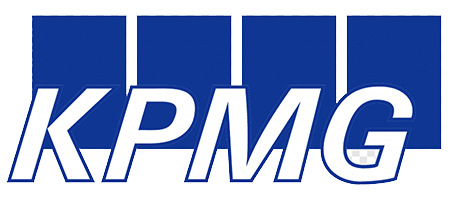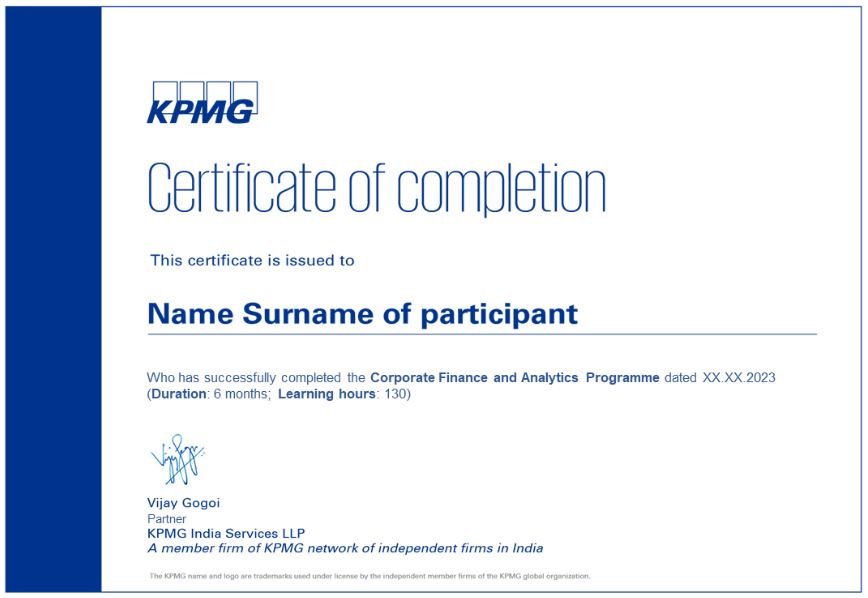Certification Program in Corporate Finance & Analytics
— Taught by KPMG in India
Sunday : 10:00 am - 1:00 pm
Program Overview
A corporate finance professional is primarily tasked with managing an organization’s money, and you could find yourself working on a wide range of matters, including capital raising (through either securing a loan from an investment bank, restructuring the business or winning financial backing through another platform, e.g. crowd-funding), valuations, acquisitions, changes in ownership and other activities to improve business. The role of a corporate financier is an exciting one; it’s forward-looking, pro-active, strategic, entrepreneurial and often international in nature.
Certification Program in Corporate Finance & Analytics taught by KPMG in India and marketed by Jaro Education will help you gain insights into the role of corporate finance in an organization and the role of financial markets in catering to financial adequacy for firms and individuals. In this hands-on program, you will be given the opportunity to learn through a variety of real-world transactions and case studies, as well as work through exercises in constructing Excel models to help deepen your understanding of concepts.
Program Highlights

Certificate of completion from KPMG in India

Multi-disciplinary curriculum with finance, analytics and business partnering

Learn from industry and subject matter experts of KPMG in India

125 hours live virtual instructor-led training

Peer networking across various industries
Admission Criteria
Who is this Corporate Finance & Analytics Course for
- Working professional between 1 to 7 years (with no CA/CFA degree) of experience as a:
- BCOM, MCOM, MBA (Finance) or similar
Eligibility & Selection
- Prior work experience from 1 to 7 years is necessary in the finance domain
- Bachelor’s degree in B.com, M.com, MBA (Finance) or similar with at least 50% marks or equivalent CGPA from a recognized institute/university
- The selection will be based on candidate’s profile evaluation and personal interview through video conferencing or Zoom
Syllabus Breakdown
- Overview of corporate finance
- Practical application of corporate finance
Capstone Project - Part 1
- Introduction to compounding and discounting
- Techniques for cash flow compounding
- Techniques for cash flow discounting
- Application of cash flow compounding & discounting in practical life
Capstone Project - Part 2
- Introduction and importance of working capital in business
- Financing of Working capital
- Working capital management and its practical application
Capstone Project - Part 3
- Long term sources of finance (Capital)
- Calculation of cost of capital through case studies
- Capital Asset Pricing Model (CAPM)
- Decision about optimum capital structure
- Meaning, application and analysis of leverages
Capstone Project - Part 4
- Process of raising funds through primary market (IPO)
- Valuation of equity shares
- Valuation of preference shares
- Valuation of debt securities shares
Capstone Project - Part 5
- Asset based valuation models
- Earnings based valuation models
- Cash flow based valuation models
- Valuations of business in mergers & acquisitions deals
Power Skills for the Corporate Finance Professional - II
- Negotiation Skills
- Project Management
Capstone Project - Part 6
- Evaluating investment opportunities
- Net Present Value (NPV) analysis
- Internal Rate of Return (IRR) and profitability index
- Capital budgeting techniques and decision criteria
- Risk analysis in capital budgeting
Power Skills for the Corporate Finance Professional - I
- Advance Excel Skills
Capstone Project - Part 7
- Phases of Portfolio management
- Risk analysis of Portfolio management
- Systematic and unsystematic risk
- Portfolio evaluation methods
Capstone Project - Part 8
- Dividend theories and implications
- Share repurchases (buyback) and their impact on shareholder value
Capstone Project - Part 9
- Data requirements for financial modelling
- Methods of forecasting
- Ratio analysis of financial statements
- Types of financial models
- Three statement model
- Debt modelling
- Leverage buyout model
- Error checks and validating the model
- Pitfalls of financial modelling
- Credit rating
- Funding lifecycle
- Alternative investment, PE VC
Final Capstone Submission
- Introduction to ESG in Finance
ESG in Finance Assignment
- Introduction to Financial Analytics and Data Analytics
- Introduction to Data Visualization tools and techniques
Power Skills for the Corporate Finance Professional - III
- Storytelling with data
- Effective Communications and Presentation Skills
Analytics Assignment
- Context setting and Careers in Corporate Finance
- Resume Writing Activity
- LinkedIn Activity
- Interview Skills
- KPIs and metrics
- Driver based plans & budgets
- Rolling Forecasts
- Introduction to dimensional profitability & uses
- Tools & Technologies
- Introduction to Business Analytics
- Introduction to terminologies in Data Analytics
- Introduction to Financial Analytics
- Structural Thinking
- Introduction to Tableau
- Date cleaning, modeling and charts in Tableau
- Case study in Tableau
- Capstone project with Tableau
- Fintech
- Blockchain
- Budget process
- Limitations of budgets and critique of the budget process
- Traditional budget
- Zero base budget
- Types of budgets
- Variance analysis and budgetary controls
- Understanding cost behavior
- Cost Volume Profit (CVP) analysis
- Break even analysis
- Make or buy; shut down or continue
- Sell or process further
- Domestic vs export sales
- Number of units to sell to earn desired profit
- Opportunity cost
- Capital budgeting – features
- Approaches to capital budgeting
- Capital budgeting techniques
- Net Present Value (NPV)
- Internal Rate of Returns (IRR)
- Payback period
- Accounting rate of returns
- Practical application
- Basics of Financial Modelling
- Structuring and designing models
- Components of Financial Modeling
- Types of Data and Variables, Growth Rates and Proportions
- Recording macros
- Assignment - Industry case study
- Difference between Finance Reporting and Performance Reporting
- Types of Finance Reports
- Design principle for Finance Reports
- Types of Performance Reports
- Topics covered in Performance Reports
- Design principle for Performance Reports
- Typical technologies used for Performance Reports
- Benefits and typical consumers of Performance Reports
- Valuation methods
- Key steps in the valuation process
- Case study: Valuation through different methods for an auto component player
- Comparable company analysis
- Precedent transaction
- Discounted cash flow method
- Valuation for start ups
- Pre-money vs. post money
- Need for external funds : Individual / Private / Public entities
- Debt vs equity
- Risk assessment
- Valuation of the business
- Where to raise funds: Decision on geography
- Types of fund raising options
- Process of fundraising
- Post fundraising
- Business Partnering in finance
- Becoming a trusted advisor
- Managing difficult conversations
- Influencing and Negotiation skills
- Where to raise funds: Decision on geography
- Structured problem solving
- Planning and organizing
- Structured communication & presentation skills
- Career Development
(Weekend sessions)
Real-world Case study
125+ Hours of Interactive Learning
Note:
- Learning levels of the tools will be intermediary in nature.
- This is an indicative list of modules and is subject to change as per KPMG in India’s discretion.

About KPMG in India
KPMG entities in India offer services to national and international clients in India across sectors. We strive to provide rapid, performance-based, industry-focussed and technology-enabled services, which reflect a shared knowledge of global and local industries and our experience of the Indian business environment.
Acheivements
- KPMG in India wins the Business World HR Excellence Awards 2020 in Learning and Development.
- People Capital Index Top – 50 : KPMG in India, including KGS (KPMG Global Services), is elated to feature in the Best 50 Companies for 2019!
- LNOD Roundtable – Best Company to work for Millennials at the Millennial Max Conference 2019 by LNOD.
Note: The KPMG name and logo are trademarks used under license by the independent member firms of the KPMG global organization. The KPMG trademarks are the sole property of KPMG International Cooperative
Faculty








Program Certificate
- Participants will be awarded ‘Certificate of Completion’ based on attendance criteria (70%).
- Participants who are unable to meet the criteria will be awarded a ‘Certificate of Participation’.

Learners Speak


Program Structure
- Any change in any of the applicable taxes during the tenure of the program, to be borne by the participant.
- Application fee is not included in the progam fee
The Jaro Advantage

- Unparalleled career guidance and support
- Dedicated student support
- Immersive and lifelong learning experiences

- Learn from the best-suited academic, faculty, and industry mentors
- Be a part of discussions and forums for enhanced learning
- Leverage peer-to-peer learning experience

- Alumni Network of 3,50,000+ Professionals
- Access to alumni events & other benefits
- Stay up to date with the latest insights from your alma mater
Jaro Expedite - Career Booster

Profile Building
Rigorously building the candidate’s profiles and resume scrutinizing their LinkedIn profiles. Jaro Education enables personalised feedback to boost overall virtual presence.

Resume Review
Moving forward with carefully curated resume reviews that ensures you are interview-ready for the workplace of tomorrow.

Placement Assistance
Get career assistance as per the profile and preferences. On average, get 5-6 job recommendations to enhance quality employment opportunities.

Career Enhancement Sessions
Bridging connectivity to link the best talent with organizations through eminent sessions from top-class industry speakers.
Note: Jaro Education or KPMG in India do not guarantee or promise you a job or advancement in your existing position. Career Services is simply provided as a service to help you manage your career in a proactive manner. Jaro Education provides the Career Services described here. KPMG in India is not involved in any way with the Career Services described above and offer no commitments.
Build 21st-Century Skill set to Gain Career Edge in the VUCA World
You’ll learn
- Develop key Behavioural Skills that are Required to be a Successful Finance Professional
- Linking Strategic Decision Making to Corporate Finance
- Estimate fund requirements and understand the use of Fundraising Processes and Techniques
- Understand and apply the Principles of Finance to Business Problems and Strategies
- Comprehend Fundamental Business Valuation Analysis and Methods and be able to apply Essential Business Valuation Concepts in Practice
- Understand the Impact that Business Decisions have both Internally and Externally on an Organization’s Performance and Effectiveness
- Understand Various types of Budget and see what Suits the Organisation Most
Yes, all students will get a certification in Corporate Finance & Analytics after completion of the program requirements.
6 months enabling weekend lectures for students.
Working professionals between 1 to 7 years (with no CA/CFA degree) of experience as a:
- BCOM, MCOM, MBA (Finance) or similar can enroll in this program.
The total program fee is INR 96,000 /- + GST
 Talk to our career expert: Ms. Prajwala Patil | +91 8976977832
Talk to our career expert: Ms. Prajwala Patil | +91 8976977832


